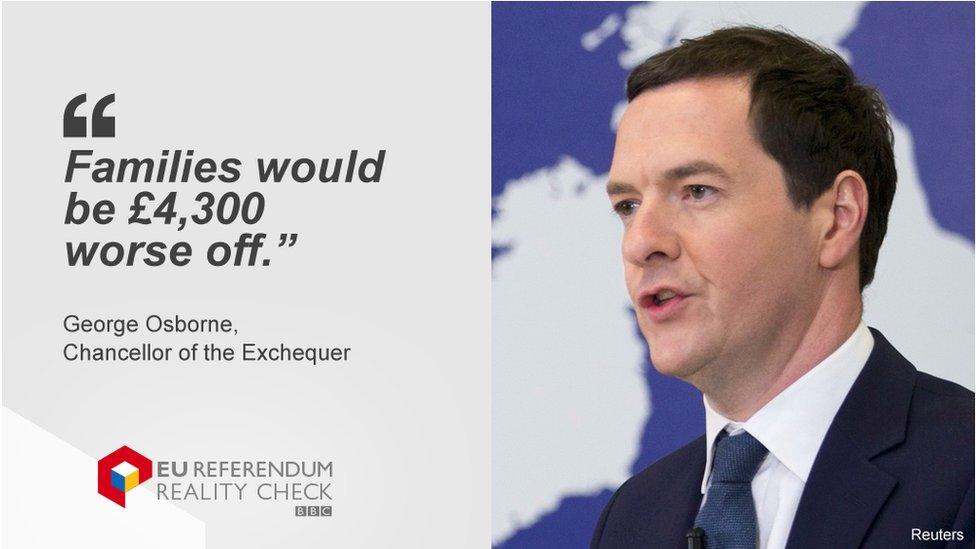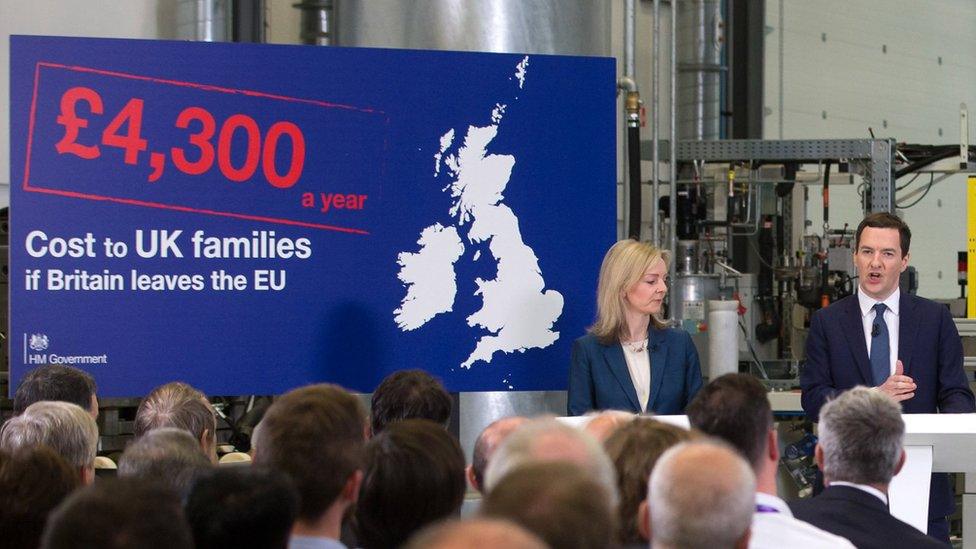Reality Check: Would Brexit cost your family £4,300?
- Published

The poster at George Osborne's event this morning made a bold claim - that there would be a £4,300-a-year cost to families by 2030 if Britain leaves the EU.
The government is confusing GDP per household with household income.
GDP per household is what you get when you add up everything produced in the economy in a year and divide it by the number of households. GDP per household does have an impact on household income, but not on a pound-for-pound basis - so you would expect it to fall by somewhat less than £4,300.
If you think about it, this must be the case. GDP is currently about £1.8tn a year - if you divide that by 27 million households you get £66,666. But average household income is about £44,000. They are clearly not the same thing.
Another thing to stress is that the Treasury is not saying that the economy would be this much per household worse off than they are now in 2030. It is saying that the economy would be 6% smaller in 2030 if the UK left the EU than it would be if it stayed in.

But the question is, how much do we believe in this sort of study at all. Reality Check has discussed in the past the problems with economic modelling.
If you don't want to be influenced by economic modelling then look away now, after all, it is very difficult to predict anything in 15 years.
If you are still reading, the thing to take away from this morning's events is this: ignore the headline figures - the Treasury thinks that leaving the EU would be bad for the UK economy, reducing its output by a considerable amount.
If what you care about is economic modelling, then this is a perfectly respectable piece of modelling, following broadly similar methodology to the one from the Centre for Economic Performance, although headlining the figure taking into account dynamic effects rather than static ones (dynamic models include changes that happen over time such as trade increasing competition or efficiency).
This is not hugely surprising - economic models tend to assume that free trade and economic cooperation are a good thing.
Looking into the detail, it is a bit odd that throughout the analysis the Treasury has used ONS forecasts for what will happen to population by 2030, without considering what difference leaving the EU would make. Given that one of the key points of leaving the EU is supposed to be to tighten up the UK's borders, it seems a mistake not to take into account that effect. It would be expected to reduce the supply of workers, although the Treasury model predicts a rise in unemployment following an exit from the UK, so there would also be less demand. The effect is discussed in more detail here.
There has also been criticism of the decision to base part of the calculation on the number of households today rather than a forecast for the number of households in 2030, which is expected to be considerably higher.
The Treasury explained that the reason this was done was to provide an illustration of what 6% lower GDP would look like to households today. So they took 2015 GDP in 2015 prices and divided by the number of households in 2015. Had they decided to use forecasts for 2030, the number of households would have been higher, but so would the level of GDP.
One useful thing from this Treasury report is that it helps put into context the significance of the UK's contribution to the EU Budget. The Treasury says that the 6% of GDP in 2030 would cut tax receipts by £36bn, dwarfing the contributions to the EU. Indeed, the Treasury has reached the £36bn figure after subtracting the UK's £7bn a year average net contribution.
Reality Check verdict: The precise figure is questionable and probably not particularly helpful. If you want to be influenced by economic modelling, the useful thing to take away is that the Treasury thinks leaving the EU would be bad for the economy, by an amount that would dwarf the savings from not having to contribute to the EU Budget.


READ MORE: The facts behind claims in the EU debate

- Published22 February 2016
